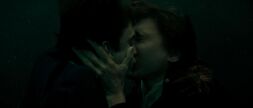The last scene and the beginning of the Swiss Army Knife Man formed a circular narrative. Manny's body fart violently, drifting away from the water from the group of people from the "normal society" who looked at him and Hank with disgust. I was particularly impressed by this scene, because among a group of adults who looked frightened or contemptuous, a child laughed. For her, this scene was funny rather than unsightly. After watching the film, think about it carefully, the arrangement of this circular narrative is very clever. A mediocre audience, like me, will undoubtedly feel embarrassed and uncomfortable to see the dense fart plot at the beginning of the movie. However, after an hour and a half of the film, the usual looks of farting, sexual desire, loneliness and stalking that cannot be integrated into the society are not so decent. In the discussion of the behavior, when seeing the final scene, the audience feels completely different about the "misbehaving" corpse.
"Normal society" is sometimes weird. When a child is whimsical, believes in faeries and ghosts, and plays house games, people think it is normal, even imaginative. And when an adult does that, he will be described as mentally retarded, freak or even creepy. If there is really any difference between these two kinds of people, that is, the age is different. The last scene is inexplicably reminiscent of the children’s fantasy adventure stories of Peter Pan and Blue Bird. Maybe there is a neverland or blue bird that only children can see in that scene, so that it can make them laugh. Adults only Saw a weird corpse.
In the movie, Manny and Sarah represent the two worlds of illusion and reality, and the right to decide which world to go to is in the hands of the protagonist Hank himself. In the ideal world represented by Manny, he He is a leader and arbiter, an adventurer on a desert island, a reliable friend, and a happy life in a normal society, so he wants to go back. However, in the reality represented by Sala, as he himself said, the more you understand me, the more you will hate me. He is a failure to achieve nothing, afraid to talk to the woman he has a crush on, lack of communication with his family, hiding in the woods behind Sarah’s house and peeping at her life. In an ideal world, Hank and Manny used a pile of garbage out of their house, friends and band members, where they both fell in love with the imagined Sarah and kissed each other when they fell into the water. As a talking corpse, Manny knows nothing about the real world. Hank instilled knowledge of the outside world: you can’t talk to people casually, you can’t sing in front of others casually, and you can’t express your sexual desire directly in front of others. Don't fart in front of others, people don't like that. Then Manny asked: Then why do we go back to the real world? It sounds like we can't do anything there. You are my best friend, and you can't even fart in front of me, it's too bad.
That moment was when Hank, a lonely person in the real world, was closest to staying in the ideal world built by him forever. When I was watching the movie, I was thinking, why not stay, why I should return to the one who is constantly being judged and judged by others. Go in the real world. As for the things that are considered indecent regardless of physical and psychological, what is wrong with them is nothing more than letting go of the body's natural needs and psychological obsessions. Of course, this kind of thinking can only exist in Manny’s world. In real life, I try to avoid talking about sex with people. It’s not that I think the matter of sex itself is so unreasonable, but when people want to talk about it with you. When things happen, what they want to talk about is often not sex itself, or their obsession with others, most of the time they just want to boast about themselves through this topic.
However, like everyone who feels unable to integrate into the mainstream society, Hanke still has a desire and need to return to reality and integrate into reality, and the picture of Sarah on the screensaver of his mobile phone is the motivation to attract him to return. Although he actually knew in his heart that life is not a game of level-breaking, Sarah is not a reward at the end of the level, and it is not that he can get Sarah after successfully leaving the desert island. Life is composed of "Maybe I can succeed this time" and disappointments. Staring at the picture of Sarah on the phone, Hank wanted to try again, but he was disappointed again. At the end of the movie, at the moment of returning to the real society, Manny, who represents the ideal world, completely died, and the Peter Pan who taught him to fly returned to Neverland. Hank could have chosen to grow up like Wendy, integrate into the adult world, replace Manny's identity, let Manny's body be the freak and perverted stalker, and even have the opportunity to keep in touch with Sarah in the future. But after Manny's death, Hank realized that what Manny represented was more important than being a normal person. His needs changed from being integrated into society to self-acceptance. Others can think of him as a freak, but he can't let Manny's body be thrown into the morgue for a few weeks, and then there will be a funeral where no one is present. So he confessed his identity to the media eager for novel news, snatched Manny's body and fled all the way to the coast.
"I'm sorry, I just want to give you everything that other people have in their lives, and those things that I didn't think I deserved before meeting you. They might laugh at us, they might call us weird nicknames, they might I think we are weird, but they don’t think it matters anymore. I only ask...you don’t die."
Hank said this to Manny's body.
The label of this movie on station B is comedy and adventure, which is reminiscent of the Budapest Grand Hotel, and the complexity of the two movies is far beyond what any label can define. The Swiss Army Knife Man is more complicated than the Grand Budapest Hotel in a sense, because the boundary between reality and illusion in the film is more blurred. Regardless of whether Manny is a super-powered, talking corpse, this thing is really illusion. It is undeniable that he is part of Hank’s personality projection. Therefore, this passage can be regarded as Hank’s attitude towards himself after returning to the real world. The confession of the missing plate in the heart. After returning to the real world, he realized that what he once thought he needed was not necessary. When they were building their dreams with Manny, they could sing and dance anytime they wanted, drinking and hosting parties all night, without caring what "others" thought. So he told the policeman who handcuffed him, and said to everyone present: "I hope you can see that scene, it's beautiful." Normal society people of course think that they are an unreasonable lunatic in front of them, using cameras. He looked at him with suspicion and disgust, after all, the eyes of adults can't see the blue bird.
At this point, the film uses a method of changing perspectives so that the audience can experience the difference between Hank and the eyes of people in the real world. In the scenes where Hank and Manny had a party together, the audience saw it all from their perspective. The light in the scene was soft, even though cool colors were used in the dawn and underwater scenes (there were still warm colors in the background) , Using a lot of large-aperture close-up and slow motion to create an unreal and even dreamy visual effect. In the eyes of Hank and Manny, all this is free and beautiful. At the end of the film, when viewing the houses and dummies they build from the perspective of outsiders, the colors are adjusted to be more realistic, in other words, closer to people's usual times. The color when looking at the scene is even colder and sharper. From this perspective, the small world built by Hank and Manny appears narrow and broken, and even the dummies made of moss and tattered iron skin add a gloomy feel. There is a shot in the middle cut to the angle of view recorded in the camera of the photojournalist. Scanning the iron dummy, the audience can almost imagine from this shot how the news will be broadcast and how it will be criticized and become the next day. Talking information in the pantry.
The sentence Manny said before he completely died was intriguing. Even though he knew that the Sarah he loved might not be the real Sarah at all, he still said to Hank: "Don't let her know how much I love her." This sentence It's like a shorthand for everyone who has had stalking experience, although Hank is the one who actually did stalking. Many people I know, including myself, have more or less stalking behavior (of course, they are generally limited to viewing the other party's social network information), and piece together an illusion of their own obsession from just a few words on the other party's social network. When doing this kind of thing, the most fearful thing is that you accidentally slip your hands until you like being found by the other person. People are so weird. While desperately trying to express their affection for the other party, they are more afraid of being caught by the other party than they are afraid of anything. discover.
When I first saw the beginning of the film, I was actually not very optimistic about the future direction. At that time, I felt that the title was too jumpy even for an independent film. Of course, seeing the ending of the film once again taught me deeply not to jump to conclusions. From a structural point of view, Manny is the questioner. From the beginning, he asked a series of questions: What is death? What is desire? what is love? What is reality? What is life? Hank uses behavior to explore and uncover the answers to these questions a little bit. In my opinion, this movie, which can be said to be crazy at the beginning, finally came back in a sad and open-minded way. Another favorite point of this film is that through the two similar and different characters of Hank and Manny, it satisfies the audience's three needs for the role in the process of watching the movie: recognition (the authenticity of a role) , Alignment (the degree to which a character can resonate with the audience), allegiance (the degree to which the audience agrees with the moral/ideology of a character). As an ordinary person with shameless appearance, no significant achievements and shyness, Hank is undoubtedly up to the standard in recognition. In reality, he is like the kind of ordinary person that can be seen everywhere on public transportation and on the street. And his characteristics as a lonely person who cannot fully integrate into the real society can resonate with most independent movie audiences. In terms of allegiance, as a stalker, he is not so able to meet the moral requirements of the audience, so the lack of this aspect is filled by Manny's role. Although Manny will make untimely speeches and performances from time to time, these are all It can be explained by the reason that he is an innocent corpse. In a broad sense, Manny is still the representative of truth, goodness and beauty in this film.
Strictly speaking, the end of the film is not a sigh of relief. Many questions have not been answered, but for the protagonist Hank, this is the end of a stage. His Peter Pan drifted away from him, but Hank knew that Manny was still alive and would always exist somewhere. At the same time, he has also turned from the weird in the eyes of others to the weird in his own eyes, although the latter is not necessarily less painful than the former. Being a weird for yourself is always more frightening than all day long, and it is easier to be afraid of becoming a weird in the eyes of others. some.
View more about Swiss Army Man reviews











